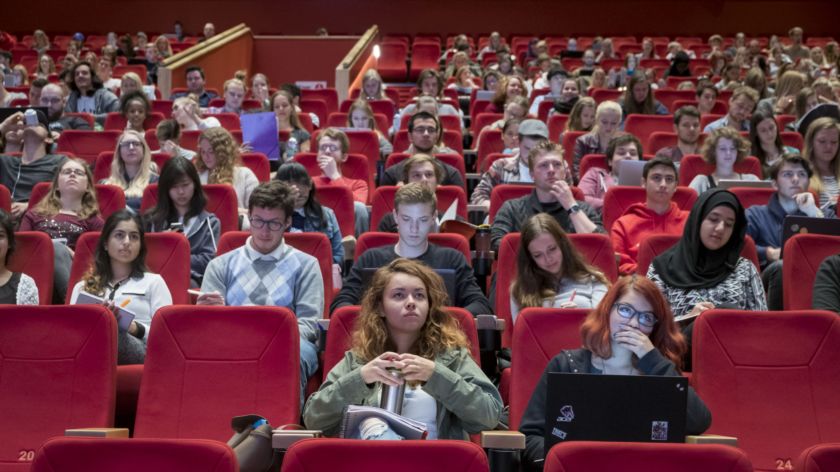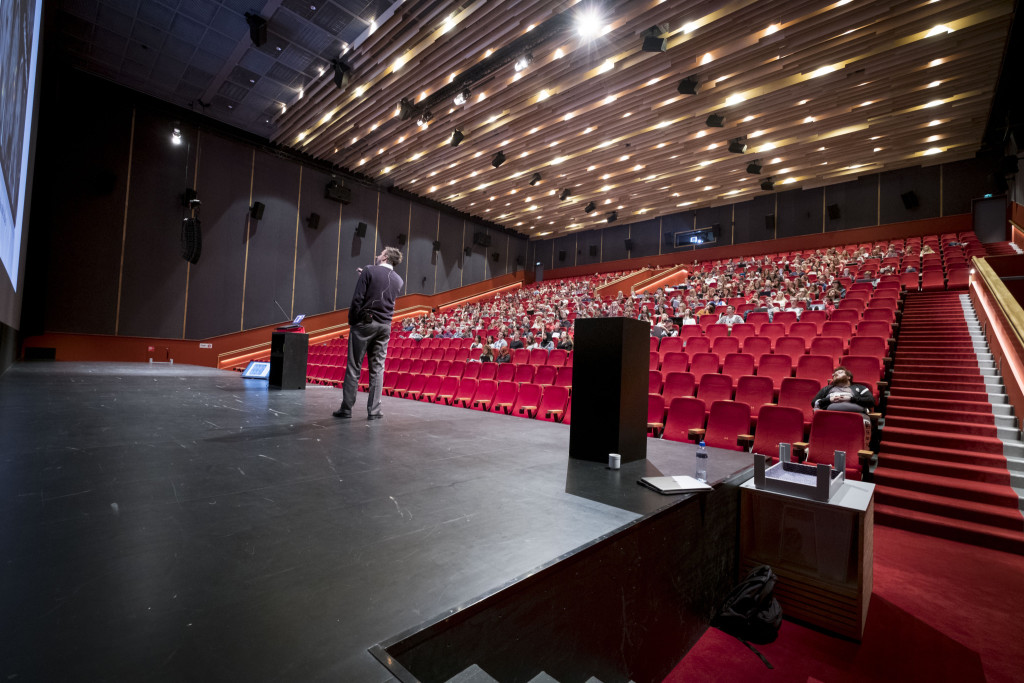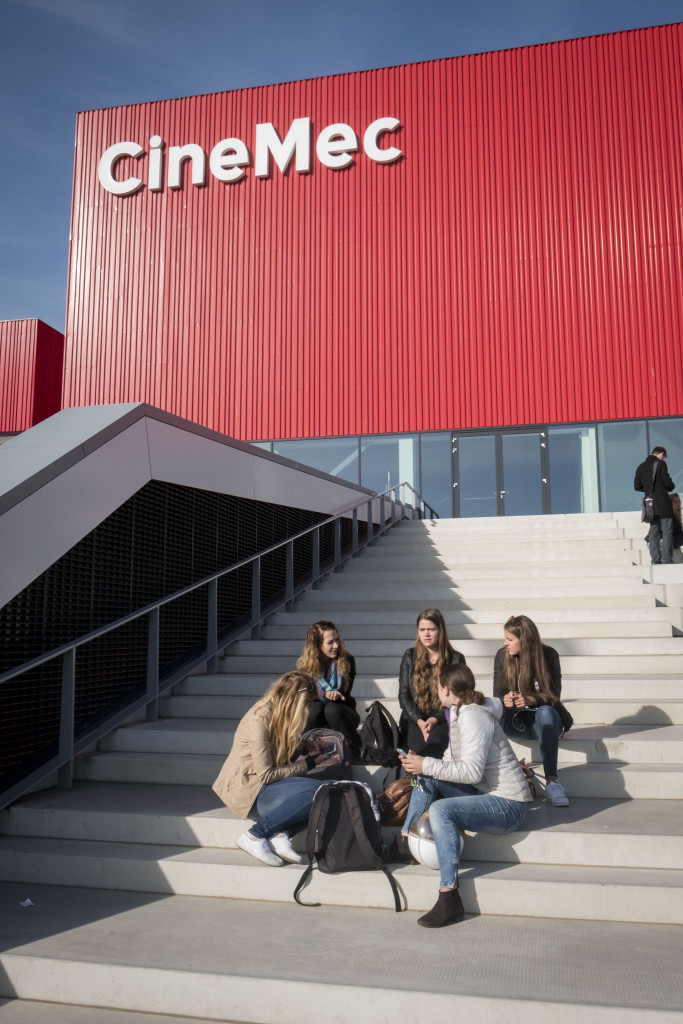Can everyone keep up?
-
 Foto: Erik van 't Hullenaar
Foto: Erik van 't Hullenaar
After the summer holidays, Radboud University launched six new English-language Bachelor's programmes. What do the students think? And do the lecturers meet the desired level? Vox joined the students in the lecture hall. 'Probably some of you have someone like Wilders in your country…'
The chatter before class is mostly in Dutch, with a bit of German and English here and there. But this changes at quarter to two on the dot. In a well-filled lecture hall in the basement of the Huygens building, Professor Allesandra Cambi teaches a two-hour class to first-year Chemistry students. That class is held entirely in English. ‘Little guys’, says Cambi, pointing to the cells. ‘If you look closely, this little guy is going in a very special direction,’ she says, tracking the cell with a light on the projector screen as it makes its way through the body. Even though three-quarters of the students are Dutch, they stick to the language of instruction. With the exception of a joke about the broken microphone.
In September, Radboud University launched its new English-language Bachelor’s programmes. Despite being referred to as ‘pilots’, the programmes look like they’re going to stick. The university hopes to become ‘fully bilingual’ in the long term. And it wouldn’t be the first university to do so: the University of Amsterdam offers an English variant of nearly all of its Bachelor’s programmes. In the future, the University of Twente and Eindhoven University of Technology plan to exclusively offer their programmes in English.
Test
Nijmegen’s eight English-language Bachelor’s programmes seem trivial by comparison. Nevertheless, they did cause quite a stir. There were concerns about the lecturers’ language level and about a general decline in the quality of education if it was not offered in the native language. Vox put this to the test and attended several English-language lectures of the Arts and Culture, Psychology and Molecular Life Sciences programmes.

Adjusting
Psychology student Mauritz Kleyn is happy with the new programmes. He deliberately chose the English track to help him prepare for an English-language research master. ‘Starting an English track now seemed like the logical choice. It gives me time to get used to it. Plus, it would be pretty bad if my research reports were full of language mistakes.’ Mauritz has no problem understanding the lecturers. ‘Almost all of the lecturers are good. You can really tell the university paid attention to this change.’
Arts and Culture Studies student Valerie van Hazendonk thinks more cultural scholars should have opted for the English track. ‘You just learn more. Studying in English may be more challenging, but it will open a lot more doors in the future.’
‘I’m not comfortable asking questions in English’
Some of the international students aren’t happy with all of their lectures. Chinese student Chen Chen is generally positive about the programme, but says she’s not as happy with some of the Arts and Culture Studies lecturers. ‘Some of them clearly have less experience with the language and stumble over their words during class. That can make it hard to follow the story. I sometimes feel like I’m missing things, especially during longer lectures.’ She also finds the programme to be strongly oriented towards Dutch students at times, like examples set in a Dutch context, required textbooks that are only available in Dutch at the University Library and Dutch films without English subtitles. These are typical teething problems for a programme that was only recently ’translated’, but Chen hopes these issues will be addressed soon.
Difference
The English-language Psychology track has some similar problems. According to the students, the quality of the Psychology in Action course – in which professional psychologists present their research – is obviously lower. Some lecturers clearly didn’t take a Radboud in’to Languages course to help them reach the desired C2 proficiency level. While this is to be expected from a one-time guest lecturer, both Dutch and international students alike are starting to notice the difference.
And how about the student’s language proficiency? Most students have no problem with the language level (‘It helps me stay focused’) and deliberately opted for the English track. Others didn’t have much of a choice. Chemistry and Molecular Life Sciences are only available in English, much to the disappointment of Pauline Borghans. ‘I had a hard time understanding everything, especially in the beginning. It’s getting better now, but there’s no way I’ll ask a question if I don’t understand something. I’m just not as confident in English.’ This is why some work groups in the life sciences are still offered in Dutch.
‘You’re more likely to stick to the same story if it’s not your native language’
Not all lecturers are equally as proficient in English. Cognitive Psychology lecturer Dennis Schutter understands this disparity. According to him, the language test they are required to take is no guarantee for the quality of the lectures. ‘I think the only way to improve your language skills is through experience. A single course won’t do much.’
Schutter has plenty of experience teaching in English and feels confident in the language, but even he admits it can be tricky at times. ‘You’re more likely to stick to the same story if it’s not your native language. Trying to explain the same thing in four different ways is harder.’ Schutter can’t say whether this will have an impact on the transfer of knowledge. ‘I guess we’ll find out during the exams. What I do wonder is: what happens if the content starts to suffer? What do we do then? This year is officially a pilot year, but I don’t see management deviating from their chosen course. There’s no way they’ll just forget about it and move on.’
Arts and Culture Studies lecturer Tom Sintobin is worried that certain nuances will be lost in translation. ‘In my course on textual analysis, we sometimes uncover three or four layers in a Hugo Claus book. Claus was Flemish, which makes it hard for Dutch students to pick up on certain references. This is nearly impossible for international students. We’ve chosen a different book for them, but it means we can’t go into as much detail as lecturers.’ Reading a Claus translation is not an option for Sintobin. ‘They are absolutely terrible, I won’t put my students through that.’
CineMec
Sintobin starts a video of a speech by Geert Wilders. ‘Probably some of you have someone like Wilders in your country…’ The translation is passed around the room on A4 sheets. After the video, several Dutch students discuss the speech with a Finnish student and a Ukrainian student, who ask some critical questions. ‘It’s easy to analyse him here at university, but wouldn’t it be way more interesting for us to discuss his views with his actual voters?’
Despite his initial lack of enthusiasm for English-language education, Sintobin is starting to ease into it a lot more. He especially loves the diversity that the international students bring to Nijmegen. An entirely new group dynamic is created for a course like European Culture, one of the few courses offered in both the Dutch and English ACS tracks. ‘I’m suddenly getting very different answers to the same questions I’ve been asking for years about Europe. That triggers new discussions and new knowledge.’ Chemistry and Biomolecular Sciences lecturer Hans Heus says that another advantage is first-year students who came from far away are often more motivated than the average Dutch student. This scales up the work atmosphere for the whole group.

English-language lectures are practically a must for the exact sciences, according to Floris Rutjes, Chemistry professor and Vice Dean of Education at the Faculty of Science. ‘Approximately 40-45% of our academic staff members, including PhD candidates and postdocs, come from abroad. All of our work meetings are held in English. It’s just not an option to exclude these people from our education.’
The Psychology programme had such a massive influx of students that it was forced to hold lectures at the CineMec theatre. The students waited for their bus to Lent those first few weeks like they were about to embark on a field trip. The atmosphere was jovial during the trip. ‘I hope there’s popcorn’, joked one student, and, ‘Maybe we’ll get 3D glasses’, said another. The campus now has enough room to accommodate its 660 students, but some work groups have to be held in the evening due to lack of space. ‘A group this size calls for a lot of classrooms, certainly if you don’t want to make any concessions in terms of student numbers. It’s important to guarantee quality of education’, says Ruud Meulenbroek, Director of the Educational Institute. CineMec is now a thing of the past. ‘This is a shame’, says Dennis Schutter, who was quite happy teaching there. ‘It’s a far cry from CC1, isn’t it? In fact, it’s just like giving a TED Talk’, he says.
Text: Maarten van Gestel and Lara Maassen
[kader-xl]
English Issues: The Teachers
Radboud in’to Languages offers English language courses to lecturers and other interested employees. Last year, 299 employees were invited to the first round of the course Lecturing in English. About half of them seized this opportunity. The other half claimed lack of time as the primary reason for turning down the offer. A new invitation was sent this year. By now, nearly all lecturers involved in an English-language Bachelor’s programme have taken a course or tailor-made sessions to improve their English.
According to Director of the Educational Institute Ruud Meulenbroek, who is responsible for the new English-language Psychology track, all of the lecturers have reached the required C2 level of proficiency. ‘All of the lecturers who are currently teaching have been screened. I also asked them to attend other English-language courses taught by their fellow colleagues. They were very positive.’ He has not yet heard of any complaints from students.
Nijmegen is setting the bar high for its lecturers, as evidenced by a research study conducted by the University of Delft on the desired language level. According to the report, slightly more than half of lecturers are at the C1 level, which the researchers believe is far too low to prepare students to become global citizens.
Liesbet Korebrits, director of Radboud in’to Languages, thinks much of the criticism these lecturers have received with regard to their language proficiency has been exaggerated. ‘Dutch students are more likely to critique the language proficiency of their lecturers than international students.’ She also discounts the argument that English-language education will jeopardise Dutch education. / Paul van den Broek, Martine Zuidweg
[/kader-xl]
[kader-xl]
English Issues: The Students
There are plenty of concerns about the advent of English-language education. Take the recent memo drafted by the Dutch Language Union, for example, which claims that the increasing Anglicisation of Dutch education poses a threat to our society. ‘If experts no longer discuss certain insights and developments in Dutch, it will become much more difficult to share these with the rest of society.’ The Dutch Language Union also believes English is not suited for certain sub-disciplines, such as law. Their advice: ensure that Dutch students can acquire academic skills in their native language – all other languages subtract from this.
Ans van Kemenade, professor of English Linguistics and president of the advisory board for the bilingual campus, shares the Union’s concerns. ‘But there’s no going back at this point. The universities are all eager to join the international march of civilisations.’ And if they’re going to do it, they might as well do it right. Not only just lecturers who are required to reach the C2 level, but also students. But do the hundreds of international students actually meet the proficiency level required by the university? ‘Everyone passed the international language test before they arrived, but the quality of that test is different in every country’, says Van Kemenade.
Liesbet Korebits, director of Radboud in’to Languages understands the Dutch Language Union’s concerns She believes English should be used where possible but that Dutch should be used in programmes better suited to it, like philosophy and Dutch law. A combination of both languages should be the norm wherever possible. She believes students should master both languages in an academic environment in order to be able to fully participate in society. She therefore advocates improving language skills across the entire learning pathway, from primary school to university; a plea that was well-received during last month’s expert meeting at the Ministry of Education. ‘This will help students excel in English-language degree programmes, while continuing to maintain excellent Dutch language skills as well. But we’re not there yet. At the moment, we’re in a transitional phase that requires us to be tolerant of the quality of English.’ / Paul van den Broek
[/kader-xl]



